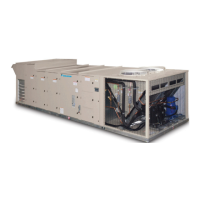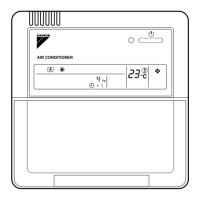• Lead/Lag Arrangement w/ MHGRH (when applicable)
— Alternate staging with circuit #1 as lead will be the
standard default arrangement.
— During cooling mode, circuit #1 will lead and load up
before starting circuit #2.
— During reheat mode, circuit #2 will lead and load up
before starting circuit #1.
— For reheat operation, compressor(s) in circuit #2 must
be active. If the unit is operating in the cooling mode
when a call for dehumidication/reheat arises,circuit
#2 will become the lead and the controller will bring
on an additional stage of coolingfor dehumidication.
If any compressors in circuit #1 are operating at this
moment they will be switched over to compressors
in circuit #2. Dehumidication operation is disabled if
circuit #2 is disabled for any reason.
• In the reheat mode, the minimum position for the reheat
valves is 10% (1.0 Vdc). The controller will modulate the
reheat valves from this starting position.
• Reheat valve(s) must be at 0% (0 Vdc) position before
starting the rst compressor in the reheat circuit to
prevent pressure spikes.
• Upon termination of dehumidication (reheat), the
maximum ramp down or decay rate of the reheat control
valves shall be 1% per sec (or 0.1V per sec).
• Upon termination of dehumidication (reheat), staging
of compressor(s) is delayed for 1 minute after reheat
capacity = 0% (0 Vdc).
• Every 24 hours, the reheat control valves will be driven to
their maximum position (10Vdc) and then returned to their
normal operating position (0Vdc). If unit is operating in
cooling or dehumidication (reheat) at the prescribed time
it will be deferred to the next time.
• Dehumidication status can now be found under the MTIII
main system menu. Reheat capacity (valve position)
can also be found under the main system menu, display
based on percentage (0-100%).
Figure 34: Modulating Hot Gas Reheat Schematic
oPTIonal modUlaTInG hoT Gas reheaT
www.DaikinApplied.com 41 IM 1058-8 • MAVERICK II ROOFTOP SYSTEMS

